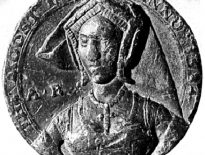Our April expert speaker is historian Nicola Tallis, author of Crown of Blood and Elizabeth's Rival. Her latest book, Uncrowned Queen, is on Lady Margaret Beaufort, the matriarch of the Tudor dynasty, and Margaret is the subject of Nicola's talk for us.
Nicola will be joining us in the Tudor Society chatroom - https://www.tudorsociety.com/chatroom/ - on 23rd April for a live Q&A session, so do join us! One lucky chat participant will also win a copy of Uncrowned Queen. Full details of the chat can be found at https://www.tudorsociety.com/tsevent/expert-live-chat-nicola-tallis-23-april/



Thank you for a great talk! I appreciate it. Margaret Beaufort is such an interesting, important person from the period. Michelle t
Hi Nicola and thanks for your marvellous talk and rescuing Margaret Beaufort from the realms of fantasy we have been fed of late by fiction and drama.
I feel she was a strong but sometimes vulnerable person, especially during the birth of her son, Henry. Imagine being just thirteen, petite and giving birth, even with the help available today. I don’t believe Edmund was a horrible man, he was only 26 himself so not a dirty old man by any stretch of the imagination, but he should have waited a couple of years at least to consummate his marriage. That was normal practice and medical and religious writing supported this view. However, he was desperate for her fortune, which he couldn’t take control off until the marriage was consummated and he had a child. It was a terrible decision which could have cost young Margaret and her child her life and most likely did cause her physical and emotional damage. But she did have her son, Henry and some people later thought he was a son of prophecy.
I see her as a woman who did everything she could for Henry and his inheritance and I mean his father’s lands and titles. I don’t see her working to put him on the throne until it became a reality until 1483 or even 1485. Margaret lost custody of him when he was small and went to live at Raglan Castle under the wardship of the Herberts. She was a shrewd lady and tried to find a way to bring him back but she had to be patient. She made two clever marriages, one with Lord Henry Stafford and after his death, one with Lord Thomas Stanley, who could find her a place in the York Hierarchy. I believe she bided her time until the time was right in order to make arrangements to pardon Henry and bring him home.
I agree that changed when Richard was made King because he was aware of the danger of France and renewed war and didn’t trust her son. We don’t know if Margaret believed the sons of Edward iv were dead or not, but she probably heard the rumours or may have even brought them to Elizabeth Wydeville in order to form an alliance. Although he wasn’t present at the Tower on 13th June Lord Stanley was involved in something but Richard seems to have thought he was an allie because he was rewarded for his support and both Margaret and Thomas played prominent roles in the coronation of Richard iii and Anne Neville.
Whatever happened to the Princes, and there is no evidence that they were killed by Richard, Margaret, Buckingham or anyone else, let alone if they survived into the reign of Henry Vii, by the late Summer 1483 that people were talking as if they had been killed. Margaret was deeply involved in the plots around the so called Buckingham rebellion as was Elizabeth Wydeville and Stanley probably was as well but was able to hide it. I believe she was encouraging Henry to invade and Richard was extremely merciful towards her. I disagree that he dare not upset Stanley, he was a person of justice and mercy and not a tyrant. He knew she was a noble woman and she was pious and pardoned her because he didn’t need to execute her. Richard was too trusting, he was vulnerable because of it and he actually pardoned people who later rebelled again. It was Richard’s judicial changes and long record of partial justice, his reforms which threatened people like Stanley who exploited for privilege and gain and that’s why he turned on him. Stanley may even be considered as much a suspect in any alleged murder of the illegitimate sons of Edward iv as anyone else. He was powerful yes, but Richard didn’t fear him.
Margaret ironically would have been executed had she done this under her grandson, to whom I believe she was close, as would Lord Stanley. She was extremely lucky and she continued to plot and funded Henry’s invasion. I see Margaret as a mother trying to secure her son’s future as a suddenness and reality. She was clever and shrewd and was well respected. She could talk people round. Yes, I also believe Margaret used the R to mean Margaret R because that’s what she was. She was the King’s Mother as Michael Jones called his book on her and she spent the rest of her life catching up with the time she had lost with him.
Margaret had power and wealth and she was also a religious woman but not a zealot. She was an activist in lots of ways and its extraordinary the power in her own name that she was given in the Midlands. When we went to Tattershall in Lincolnshire there was information and her coat of arms and about her ownership for a time. I believe she helped Elizabeth of York as a mother in law, certainly wasn’t the evil ogre of Philippa Gregory and there isn’t any evidence that she killed the Princes, but you never know. Like many things, its a very late tradition anyway. I see Margaret as a very great and extraordinary womam as many of the women of the Wars of the Roses were. She was involved in plots and treason but was shrewd enough to change sides when it appeared wise to do so. She lived an excellent life and its good that she is getting proper attention at last.
Thanks again for your excellent talk. Sorry I missed the chat. Thanks again for your wonderful book, beautifully written and for doing the myths to death.
Agreed! I’ve read a lot of Philippa Gregory books and the only one that shows her in a good way is The Red Queen (the biographical one!). It’s so annoying that Phillipa only chooses to portray her as an obsessive, controlling and religious old woman, not writing about Margaret’s vulnerabilities and true character. Poor Margaret and other women of the War of The Roses don’t get enough respect and get dismissed to flat stereotypes that reflect nothing of the true women.
I don’t think a man who uses his servants to threaten over seventy old ladies will be merciful and just throughout his life. Humans are complex. Before returning to Henry VIII, killing a noblewoman was absurd, and Stanley was very important to a usurper. Richard was likely afraid that Stanley would betray him. In fact, it was William Stanley who truly betrayed Richard. (He is most likely due to his loyalty to Edward IV)
I don’t think a man who uses his servants to threaten a seventy something old lady will maintain kindness and justice throughout his life. Humans are complex. Before Henry VIII, killing a noblewoman was absurd, and Stanley was very important to a usurper. Richard was likely afraid that Stanley would betray him. In fact, it was William Stanley who truly betrayed Richard. If Richard truly believed in Stanley, he would not have placed his son under house arrest, most likely due to his loyalty to Edward IV.